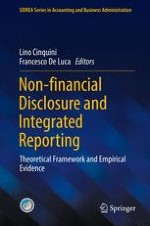The increasingly crucial role of companies’ non-financial disclosure (NFD) and integrated reporting (IR) has led to a lively debate among academics, practitioners, and regulators on the approaches, framework, contents, principles, and standards that should oversee these forms of reporting. Through several expert contributions, conducted both with qualitative and quantitative methodologies, this book provides an up-to-date portrait of the debate by exploring corporate NFD either in its mandated contents or voluntary information. Contributing authors provide studies that encompass the different lines of NFD, namely non-financial risk reporting, sustainability reporting, and intellectual capital reporting, as well as the integration of financial and non-financial information through IR, the assurance of the NFD and IR through auditing activities, and the role of management and CFOs in NFD and IR.
